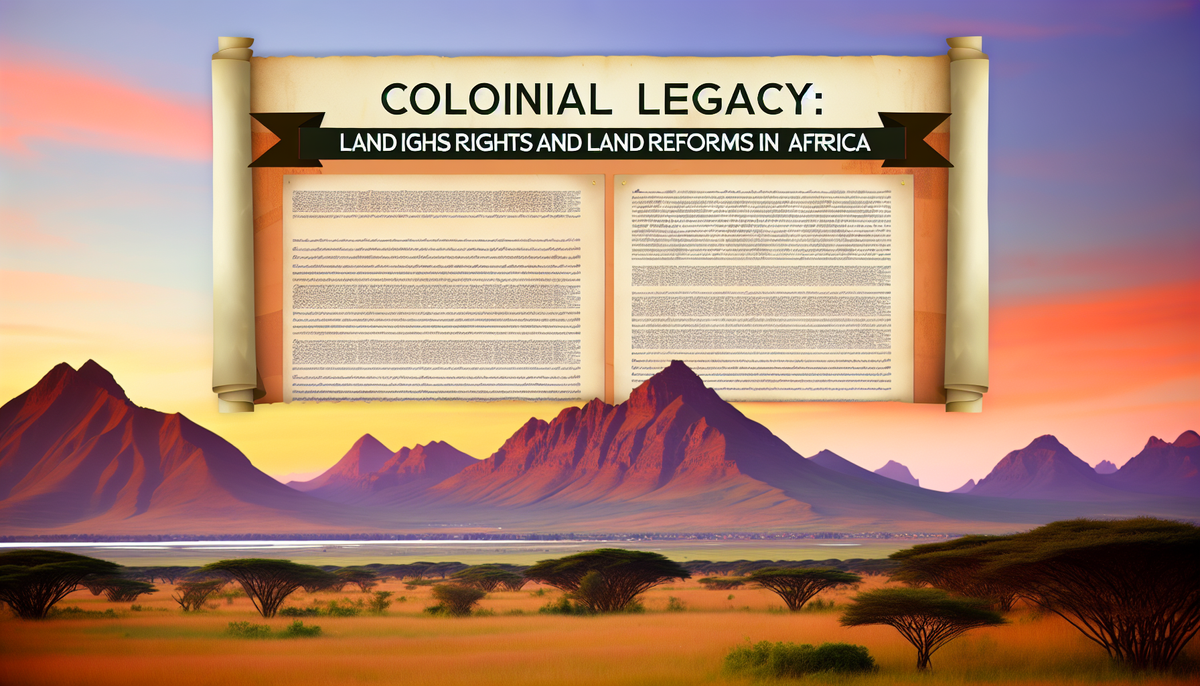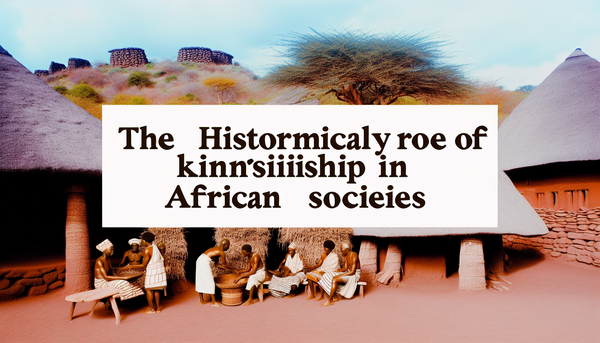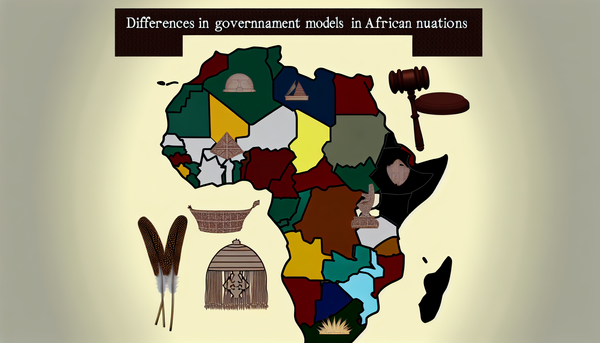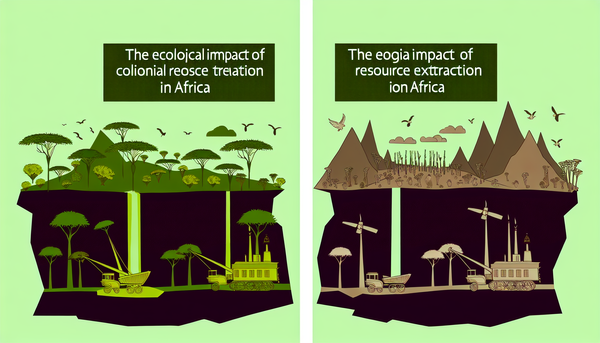Colonial Legacy: Land Rights and Land Reforms in Africa

Introduction: Understanding Colonial Legacies in Africa
The impact of colonialism on land rights in Africa is profound and enduring. During the colonial period, European powers imposed new systems of land ownership that disregarded traditional practices and disrupted long-standing relationships between communities and their land. Indigenous populations were often stripped of their rightful claims, as colonial regimes enacted laws that favored settler populations and foreign interests, fundamentally altering the landscape of land tenure.
This legacy of dispossession has created complex challenges for contemporary African nations. Many countries grapple with the consequences of unequal land distribution, social unrest, and economic disparities rooted in colonial policies. Moreover, the struggle for land rights is not merely a historical issue; it continues to shape political discourse and development strategies across the continent.
As nations seek to address historical injustices, understanding the colonial legacy becomes crucial. This exploration of land reforms and rights is vital for recognizing the barriers that persist today and for envisioning pathways toward equitable land governance. This blog will delve into the nuanced dynamics of land rights and reforms in Africa, offering insights into their historical context and contemporary relevance.
Historical Overview: Pre-Colonial Land Ownership
Before the onset of colonial rule, African societies had diverse systems of land ownership that were deeply intertwined with cultural practices, social structures, and communal values. Land was viewed not as a mere commodity, but rather as a shared resource essential for the survival and identity of communities. Different regions exhibited varying practices, with some areas emphasizing communal ownership while others recognized individual rights within a broader collective framework.
In many communities, land was allocated based on familial ties, customary law, and agricultural needs. Elders or local chiefs often played a pivotal role in managing land use, ensuring that the needs of the community were met and that resources were distributed equitably. This approach fostered a sense of stewardship, with an emphasis on sustainable practices that respected the environment.
Moreover, land was intrinsically linked to social status and identity; it served as a foundation for cultural heritage and community cohesion. For instance, rituals and spiritual beliefs often revolved around land as a sacred entity. Understanding these pre-colonial systems is crucial in contextualizing the disruption caused by colonial land policies and underscores the significance of reclaiming land rights in the contemporary landscape of Africa.
Effects of Colonialism on Traditional Land Systems
Colonialism profoundly disrupted traditional land systems across Africa, imposing foreign governance structures that disregarded indigenous practices and relationships with the land. The introduction of new legal frameworks prioritized private land ownership over communal stewardship, effectively alienating local populations from their ancestral territories. European powers appropriated vast tracts of land for settler agriculture, resource extraction, and infrastructure development, leading to widespread dispossession of indigenous peoples.
The forced imposition of individual land titles disrupted communal ties and social cohesion, as families were often fragmented and traditional authority systems eroded. Many indigenous communities, who had relied on collective land use, found themselves marginalized and economically disadvantaged, facing barriers to accessing natural resources essential for their livelihoods.
Colonial policies also favored certain ethnic groups, exacerbating social inequalities and sowing divisions that persist today. The legacy of land dispossession fueled conflicts over land rights and ownership that continue to affect contemporary African societies. Moreover, this disruption has had lasting economic repercussions, contributing to poverty and underdevelopment.
Understanding these colonial impacts on traditional land systems is vital for addressing historical grievances and formulating effective land reforms that honor the rights and needs of indigenous populations in post-colonial Africa.
Post-Independence Land Reforms and Challenges
In the wake of independence, many African nations sought to address the injustices of colonial land dispossession through various land reform initiatives. These reforms aimed to redistribute land more equitably among indigenous populations, reinstate customary land practices, and promote agricultural productivity. Nevertheless, the implementation of these reforms faced significant challenges.
One major obstacle was the deeply entrenched power dynamics left over from colonial rule. Many post-colonial governments struggled to balance the interests of returning lands to indigenous communities while satisfying the demands of former settlers and powerful elites who had benefited from colonial land policies. This often led to conflict, ineffectual reforms, and a reluctance to challenge the status quo.
Additionally, bureaucratic inefficiencies, corruption, and lack of political will hampered reform efforts. In some cases, land reforms were implemented without adequate consultation or consideration of local customs, resulting in tensions and further marginalization of vulnerable populations. Furthermore, global economic pressures, including the push for privatization and commercialization of land, often undermined the goals of equitable land distribution.
Despite these challenges, the journey toward meaningful land reform remains critical for fostering social justice, economic development, and sustainable land management in contemporary African societies.
Case Studies: Land Rights in Zimbabwe and Kenya
Zimbabwe and Kenya present distinct yet revealing case studies in the struggle for land rights shaped by colonial legacies and post-colonial reforms. In Zimbabwe, the land reform program initiated in the late 1990s aimed to address the stark inequities established during the colonial era, where a minority of white settlers owned vast agricultural lands. The program sought to redistribute land to landless black farmers; however, it was marred by controversy and violence. While it successfully transferred land ownership to many, chaotic implementations led to economic decline, food insecurity, and political tensions that ripple through the country to this day.
Conversely, Kenya’s post-independence land reforms faced different challenges. Following independence in 1963, the government initiated the Swynnerton Plan to increase agricultural productivity and secure land rights for local farmers. However, land distribution favored politically connected elites, leaving many smallholders landless. The struggle for equitable land access has fueled ongoing conflicts, particularly in the Rift Valley region, where historical grievances over land ownership continue to ignite ethnic tensions.
Both countries illustrate the complexity of land rights issues in Africa, highlighting the critical need for inclusive policies that address historical injustices while fostering social stability and economic resilience.
Current Policies and Their Impact on Rural Communities
Current land policies across Africa increasingly aim to rectify historical injustices while promoting sustainable development and food security. However, the effectiveness of these policies varies significantly, with profound implications for rural communities. In many countries, governments are implementing land reforms that focus on formalizing land tenure rights, promoting equitable access, and recognizing customary land titles. These initiatives are intended to empower local populations and encourage investment in agriculture.
Yet, despite these efforts, rural communities often face significant challenges. Bureaucratic inefficiencies, lack of transparency, and corruption can hinder the implementation of policies intended to benefit landless and marginalized groups. In some regions, powerful interests, such as multinational corporations, often dominate land deals, leading to land grabs that displace local farmers and disrupt traditional livelihoods.
Moreover, many rural communities remain unaware of their rights under these new policies, limiting their ability to advocate for equitable land access. Even when policies exist to support their rights, inadequate enforcement mechanisms often leave them vulnerable to exploitation.
Ultimately, for current land policies to have a meaningful impact, they must be executed with genuine community involvement, respect for local customs, and a commitment to social and environmental justice. Only then can rural communities truly benefit from these reform efforts.
Future Perspectives: Sustainable Land Management in Africa
Looking ahead, sustainable land management (SLM) is crucial for addressing the multifaceted challenges facing Africa, including rapid urbanization, climate change, and food insecurity. As the continent grapples with these issues, integrating sustainable practices into land use governance becomes imperative for fostering resilience and promoting economic growth.
SLM emphasizes balanced approaches that consider ecological health, social equity, and economic viability. Innovative agricultural practices, including agroforestry, conservation agriculture, and organic farming, are gaining traction, enabling communities to enhance productivity while preserving ecosystems. Furthermore, the recognition of indigenous knowledge in managing land and resources is essential, as it promotes practices that have thrived for generations.
Policy frameworks supporting SLM must prioritize local participation, ensuring that communities have a voice in decision-making processes. Collaborative efforts among governments, NGOs, and local stakeholders can drive the adoption of sustainable practices. Additionally, harnessing technology—such as remote sensing and geographic information systems (GIS)—can enhance land monitoring and management.
In this context, international partnerships and investment in research and education are vital to build capacities for sustainable land practices. By prioritizing SLM, African nations can pave the way for a more resilient future, ensuring food security and environmental sustainability for generations to come.



